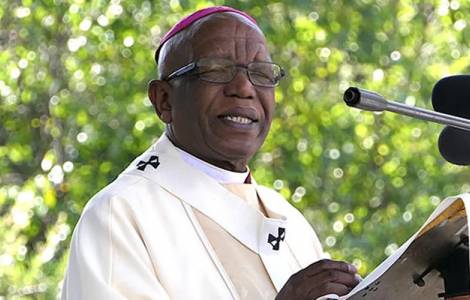
Johannesburg (Agenzia Fides) - The SACBC Liaison Bishop for Migrants and Refugees, Archbishop Buti Tlhagale OMI of Archdiocese of Johannesburg, attended the virtual inaugural meeting of the Multi-Religious Council of Leaders on Tuesday 13th April 2021. His Grace was invited by the United Nations High Commission for Refugees (UNHCR) to be a member of Multi-Religious Council of Leaders and the UNHCR’s high level supporter. The invitation came after a constructive collaboration and networking of the Catholic Church through different stakeholders to the UNHCR. This is an important recognition of the commitment of the Catholic Church in South Africa to people seeking asylum.
The Multi-Religious Council of Leaders was established by UNHCR, the United Nations Refugee Agency in cooperation with Religions for Peace. The Council consists of more than 20 religious and spiritual leaders representing the world’s diverse faith traditions and experience in building a culture of peace that protects the most vulnerable. The purpose to have a Multi-Religious Council of Leaders is to strengthen efforts to address the root causes of conflict and displacement, and in supporting peacebuilding, inclusivity and reconciliation.
During the virtual meeting of the Multi-Religious Council of Leaders, the leaders made individual commitments in the promotion of peace, and expressed their commitment of support to the forcibly displaced people in their respective countries and regions. His Grace Archbishop Buti Tlhagale said: "If religious leaders use their platforms to promote language that supports protecting, welcoming and integrating, it will raise awareness in communities of the moral obligation to welcome and protect".
The Council members’ mandate extends until the second Global Refugee Forum in 2023. South Africa welcomes migrants and refugees, often not recognized by local authorities.
Just in these days Home Affairs Minister Aaron Motsoaledi announced the closure of two temporary shelters in Cape Town by the end of April, adding that the refugees hosted there have the possibility to voluntarily repatriate to their countries of origin or to reintegrate into the local communities.
Protesting refugees and asylum seekers were welcomed there under disaster management regulations for nearly a year. The group, who has been protesting since October 2019, has called for resettlement to Canada, citing fears of xenophobic violence in South Africa and problems to obtain documents from the Department of Home Affairs. Group resettlement, however, has been repeatedly denied by the United Nations High Commissioner for Refugees as it contravenes international protocols, but two options have been put on the table: the first, reintegration into local communities and the second, the voluntary repatriation to their countries of origin. (L.M.) (Agenzia Fides, 21/4/2021)